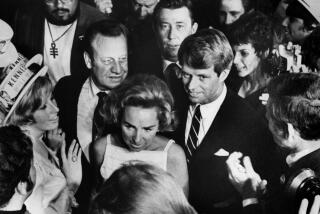50 years later, JFK girlfriend Judith Campbell Exner deserves an image makeover
The three gunshots fired in Dallas 50 years ago meant a presidential legacy unfulfilled — and a personal life unresolved.
The sorry mess of sexual exploits that President John F. Kennedy left behind took years to emerge. The supporting cast was vast, and I knew one of them, a woman who was, next to Marilyn Monroe, the most famous one, though not by her choice.
Judith Campbell Exner was the first of JFK’s lovers to be publicly identified, and so she was pilloried by a public furious at learning that at least one wing of Camelot had more in common with the Playboy Club.
When I met her, in the late 1990s, she was living in virtual seclusion in Orange County, a permanently wounded soul, first by JFK, then by a congressional committee that had promised her anonymity and then had thrown her under the bus — and ever after by a public that didn’t much want to hear what she had to say on her own behalf, and let her know it.
“People who loved Jack,” she told me, “felt if they could degrade me, then he was just a bad boy. On the other side [his critics] felt they could destroy Jack by destroying me, by making me as bad as possible.”
She loved JFK unwisely and too well; he clearly was far more important to her than she to him, although their relationship went on for several years. And had she known then about all those other women, she told me, she would have walked out.
She was the well-off daughter of a prosperous architect. She grew up in Pacific Palisades, a Roman Catholic who married at age 18 and was divorced several years after from her philandering husband. She felt guilt-wracked for that, and then for sleeping with the president who was the star of the nightly news.
Her actor-husband had moved the couple into Hollywood circles with the likes of Frank Sinatra; it was Sinatra who introduced Judith to a Massachusetts senator who was running for president, and a man she knew as businessman Sam Flood — in fact, mobster Sam Giancana.
Here’s much more of what she told me about what she was and wasn’t — myth-busting that “mob moll” stuff, and explaining her thoughts about tawdry matters like the Bill Clinton-Monica Lewinsky affair.
I liked her, but more than that, I felt sorry for her, fearful, ill, locked in the past. I thought she had been treated scandalously by men who purported to love her and by men who made and wrote history.
After the shock of the JFK assassination, she isolated herself from almost everyone but people she knew from her old life. She was afraid she would be killed too. She had been told the FBI was keeping tabs on her. And the day after Marilyn Monroe died, she said, her apartment had been burgled, the phone records taken but the jewels left behind.
She is a fragile vehicle for a national reassessment of political private lives, but she is that nonetheless. JFK’s sexual escapades were known in his circles and to some in the media, who kept quiet.
It was a hypocritical time, an age of double standards, the decorous, duplicitous 1960s. Later true accounts like those by Kennedy’s lovers, and fictional versions of the period like “Mad Men,” show the era for what it was: Men who got “the babes” earned the atta-boy admiration from other men; women who were the “babes” were, by definition, sluts, the topics of sniggering gossip.
Exner’s reputation deserves to be made over with contemporary understandings, not the frat-boy innuendo of the 1960s. In the 1970s, the personal started to become political. Treating women like Kleenex was no longer the mark and privilege of an important man, and what might have been just good ol’ boys’ good times 50 years ago now has public and political consequences, from Anthony Weiner to Mark Sanford to Bob Filner. Today she would hear not just insults and threats; she would find legions of women siding with her and supporting her.
Exner died in 1999. I was invited by her family, her friends and her gallant lawyer, Mark Allen, to join them as they scattered her ashes at sea, off Newport Beach.
So she has no grave, but she has an epitaph, a modest request. She said again and again: “You don’t have to like me, you don’t have to approve of me. But when you make your judgment, you have to know the truth about me.”
ALSO:
Harry Reid busts the filibuster
McManus: Obama’s reversal of fortune
Follow Patt Morrison on Twitter @pattmlatimes
More to Read
A cure for the common opinion
Get thought-provoking perspectives with our weekly newsletter.
You may occasionally receive promotional content from the Los Angeles Times.











